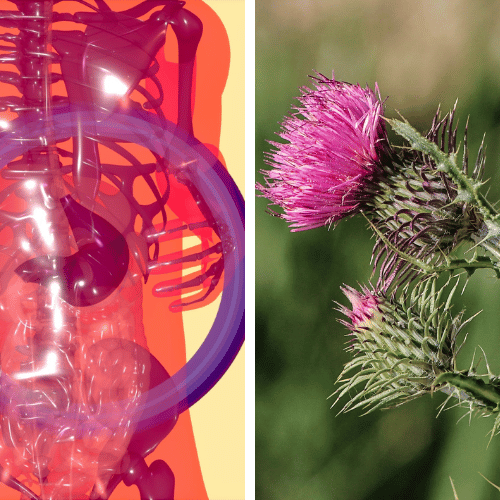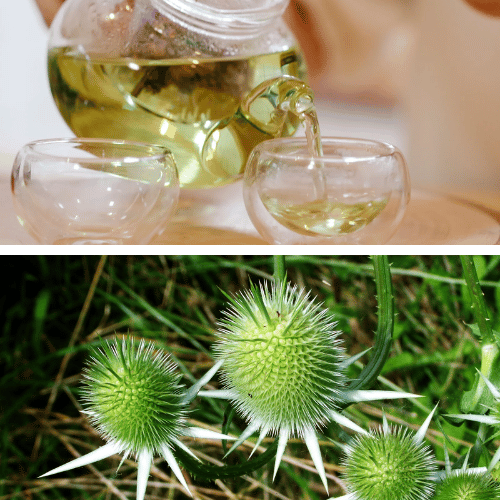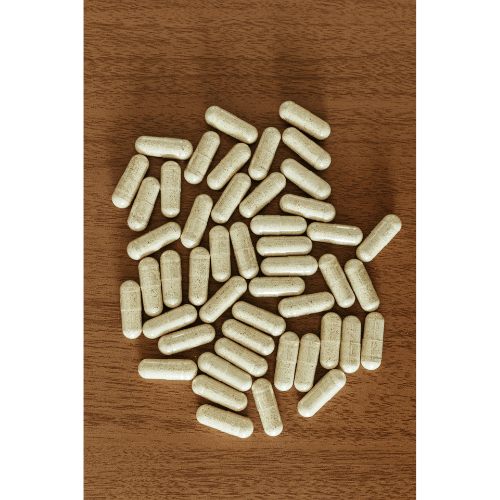Did you know that liver diseases are silently stalking millions worldwide, making them a critical health concern on everyone’s radar? With the unsettling increase in these conditions, it’s no wonder that countless individuals are seeking refuge in alternative treatments, with milk thistle taking the spotlight as a popular herbal remedy. But the lingering question remains - Is milk thistle actually good for your liver?
In this enlightening journey through the realms of herbal wonders, we’ll delve deep into the heart of milk thistle’s storied connection to liver health, scrutinize the solid scientific evidence (or lack thereof), and offer a helping hand on navigating the myriad of choices when it comes to milk thistle supplements. We’re here to guide you through the maze of information, address your concerns, and help you make informed decisions. Let’s together unveil the truth, demystify the myths, and answer the burning question: Is milk thistle actually good for your liver?
Highlighted Key Takeaways
- Milk thistle’s proposed mechanisms support liver health, from reducing inflammation and combating oxidative stress to shielding cells from damage and promoting regeneration.
- The landscape of research on milk thistle is varied and ever-evolving, with some studies showing promise and others leaving us scratching our heads. Together, we’ll sift through the data to see what research is still needed to determine optimal dosage & duration.
- So, let's weigh the pros and cons and uncover whether combining a balanced diet, regular physical activity, and milk thistle supplementation can indeed be your secret weapon against liver disease. Stay tuned as we unravel the mysteries and present the facts you need to know!
Milk Thistle and Liver Health: The Connection

Milk thistle, a natural remedy with a long history in traditional medicine, has been used for centuries to address various health issues, particularly those related to the liver. Its potential liver benefits are attributed to its active component, silymarin, which has potent antioxidant and anti-inflammatory properties. However, despite numerous studies and anecdotal evidence, the definite connection between milk thistle and liver health is still a subject of ongoing research.
One of the most significant potential benefits of milk thistle is its ability to support liver health, particularly in cases of alcoholic liver disease, nonalcoholic fatty liver disease, and chronic hepatitis. While medical professionals do not recommend milk thistle as the primary treatment for liver issues, it may be beneficial as an additional treatment option if approved by a healthcare provider.
So, how does milk thistle work, and what does the clinical evidence say about its liver benefits?
Silymarin: The Active Component
Silymarin, derived from milk thistle seeds, is the primary active ingredient responsible for the potential liver benefits of this herbal remedy. As an antioxidant, silymarin helps protect the liver from damage caused by free radicals and oxidative stress, common in liver disease.
While silymarin is the main component of milk thistle associated with its liver-protecting effects, understanding how milk thistle works to support liver health is equally important.
How Milk Thistle Works
One of the proposed mechanisms of action for milk thistle in supporting liver health is its ability to provide milk thistle benefits, such as:
- Reduce inflammation and oxidative stress in the liver
- Protect liver cells from damage caused by free radicals produced during the metabolism of toxic substances
- Improve liver function and reduce the risk of liver disease
- Facilitate the regeneration and repair of the liver, which is crucial in maintaining overall liver health
Even though these findings are promising, keep in mind that scientists have not yet fully understood the exact mechanisms by which milk thistle supports liver health. More research is needed to establish a definitive connection between milk thistle use and liver health benefits. Meanwhile, it’s worth paying attention to the available clinical evidence supporting milk thistle’s liver benefits.
Clinical Evidence Supporting Milk Thistle's Liver Benefits

Clinical evidence regarding milk thistle’s liver benefits is somewhat conflicting. While some studies have found potential hepatoprotective effects through antioxidant activity and other mechanisms, other research has yielded less conclusive results.
To gain a clearer understanding of milk thistle’s potential liver benefits, it’s helpful to examine both the positive findings and limitations of current research.
Positive Findings
Some clinical research on milk thistle’s liver benefits has yielded promising results. For example, studies have found that substances in milk thistle, particularly the flavonoid silymarin, may provide liver protection from toxins and improve liver function. Moreover, milk thistle has been shown to reduce inflammation and oxidative stress in the liver, potentially supporting liver health in individuals with various liver conditions.
However, bear in mind that the results of these studies are not consistently the same. Some studies have not found clinically meaningful benefits or improvements in liver diseases, indicating the need for further research to clarify milk thistle’s potential liver benefits.
This leads us to the current limitations of clinical trials and potential areas for future research.
Limitations and Areas for Further Research
One of the main challenges in studying milk thistle’s liver benefits is the limited scope and quality of existing research. Many studies have small sample sizes, short durations, and lack of control groups, making it difficult to draw definitive conclusions about milk thistle’s effectiveness. As a result, additional extensive human studies of high caliber are necessary to affirm the liver benefits associated with milk thistle and determine the optimal dosage and duration of use for various liver conditions.
Despite these limitations, the potential benefits of milk thistle for different liver conditions warrant further exploration. Next, we’ll explore the potential benefits of milk thistle for various liver conditions, including alcoholic liver disease, nonalcoholic fatty liver disease, and chronic hepatitis.
Using Milk Thistle for Different Liver Conditions

Milk thistle has been found to be potentially beneficial for a variety of liver conditions, including alcoholic hepatitis and cirrhosis, nonalcoholic fatty liver disease, and chronic hepatitis. While some studies suggest promising results in these areas, it’s essential to remember that further research is necessary to gain a more comprehensive understanding of milk thistle’s efficacy in treating these conditions.
Let’s delve into how milk thistle may prove beneficial for each of these liver conditions.
Alcoholic Liver Disease
Alcoholic liver disease is a condition characterized by damage to the liver caused by excessive alcohol consumption. Some evidence suggests that milk thistle may help individuals with alcoholic liver disease by reducing inflammation and improving liver function. However, it’s important to note that the available research on milk thistle and alcoholic liver disease is limited, and more studies are needed to confirm its effectiveness in treating this condition.
In the meantime, individuals with alcoholic liver disease should focus on addressing the root cause of their condition – excessive alcohol consumption – and work with their healthcare provider to develop an appropriate treatment plan. Incorporating milk thistle as part of a comprehensive treatment strategy may be beneficial, but it should not be considered a standalone solution.
Nonalcoholic Fatty Liver Disease
Nonalcoholic fatty liver disease (NAFLD) is a condition in which fat accumulates in the liver, not due to excessive alcohol use. Although the exact cause of NAFLD is not yet established, it is often associated with obesity, diabetes, and elevated cholesterol levels. Some research has indicated that milk thistle may help reduce inflammation and improve liver function in those with NAFLD, as well as potentially reduce the risk of developing complications associated with chronic liver disease.
However, as with alcoholic liver disease, more research is needed to confirm milk thistle’s effectiveness in treating NAFLD. Individuals with this condition should work with their healthcare provider to develop a comprehensive treatment plan that addresses the underlying causes of NAFLD and includes lifestyle modifications such as a healthy diet and regular exercise.
Chronic Hepatitis
Chronic hepatitis is a long-lasting inflammation of the liver that can eventually lead to liver damage and disease. Research has indicated that milk thistle may help reduce inflammation and protect the liver from the damage caused by chronic hepatitis. However, as with other liver conditions, more studies are needed to confirm milk thistle’s effectiveness in treating chronic hepatitis.
In the meantime, individuals with chronic hepatitis should work with their healthcare provider to develop an appropriate treatment plan that addresses the underlying cause of their condition. Incorporating milk thistle as part of a comprehensive treatment strategy may be beneficial, but it should not be considered a standalone solution.
Safety and Side Effects of Milk Thistle
While milk thistle is generally considered safe and well-tolerated by most people, it’s essential to be aware of potential side effects, interactions, and contraindications before using it as a supplement for liver health.
Next, we’ll delve into the general safety of milk thistle and the potential interactions and contraindications that one should consider.
General Safety
Milk thistle is generally regarded as safe when taken orally in recommended doses. Most people can use milk thistle without experiencing any significant side effects, although mild gastrointestinal discomfort, such as a laxative effect, is the most commonly reported side effect. In some cases, individuals may experience:
- Stomach upset
- Diarrhea
- Nausea
- Rash
Also, bear in mind that milk thistle can trigger allergic reactions in people allergic to certain plants, especially those in the Asteraceae family. If you have a known allergy to these plants or experience an allergic reaction after taking milk thistle, it’s essential to discontinue use and consult your healthcare provider.
Potential Interactions and Contraindications
While milk thistle is generally considered safe, it may interact with certain medications and may not be suitable for people with specific health conditions. For example, milk thistle may interfere with the enzyme Cytochrome P450 2C9 (CYP2C9) and the drugs it processes, resulting in lowered blood sugar levels and increased systemic exposure to certain drugs.
Additionally, milk thistle may increase the effects of drugs that reduce blood sugar levels, which could be a concern for individuals with diabetes. In terms of contraindications, individuals with the following conditions should avoid taking milk thistle:
- Diabetes
- Kidney disease
- Those taking anticoagulant medications.
As always, consulting a healthcare provider before starting any new supplement, including milk thistle, is vital to ensure its safety and appropriateness for your health needs.
Choosing and Using Milk Thistle Supplement

As we journey through this captivating world of milk thistle and its potential benefits, it’s essential to know how to choose and use milk thistle supplements. With a plethora of products on the market, gaining insight into the distinct varieties and their recommended dosages for liver support becomes imperative.
Types of Milk Thistle Products
Milk thistle products are available in several forms, including:
- Capsules
- Tablets
- Liquid milk thistle extract
- Powders
- Milk thistle tea
These products are derived from the plant where milk thistle grows.
Each of these forms is derived from different parts of the milk thistle plant, offering a range of options for consumers. Capsules and tablets are prevalent and generally more economical, making them a convenient choice for many. For a more in-depth look at the available capsule options, refer to my article, “The 5 Best Milk Thistle Supplements - Ranked and Reviewed,” published in early 2023.
On the flip side, liquid extracts and powders are more concentrated and, therefore, might cater to those who find pills challenging.
And let’s not forget the comforting embrace of milk thistle tea. Made from the dried leaves of the milk thistle plant, it is another popular option. It’s milder and can be consumed both hot and cold, providing a versatile choice for those who prefer beverages over pills or extracts.
Dosage Recommendations
Dosage recommendations for milk thistle supplements can vary, depending on the product type and individual health needs. Generally, a dosage between 200 to 400 milligrams per day is recommended for most individuals. However, it’s essential to consult a healthcare provider before starting any new supplement to receive personalized advice on dosage and to check for potential interactions with other medications.
In addition to using milk thistle supplements, adopting other healthy lifestyle habits can also contribute to liver health. In the next section, we’ll discuss additional strategies for maintaining optimal liver function.
Additional Lifestyle Tips for Supporting Liver Health
In addition to incorporating milk thistle supplements into your daily routine, maintaining a healthy lifestyle is crucial for supporting liver health and reducing the risk of liver disease. A balanced diet that includes a variety of foods from all food groups, such as fruits, vegetables, whole grains, lean proteins, and healthy fats, can help provide the nutrients your liver needs to function optimally.
Engaging in regular physical activity is another essential component of a liver-healthy lifestyle. Exercise can help enhance overall health, reduce the likelihood of developing chronic diseases, and improve liver function. Additionally, abstaining from excessive alcohol consumption and managing stress levels can further contribute to a healthy liver.
Combining these lifestyle measures with milk thistle supplementation may bolster your liver’s health and overall well-being.
Concluding Thoughts on Milk Thistle and Liver Health Benefits
In our exploration of milk thistle, we’ve delved deep into its historical roots, unearthed its traditional uses, and scrutinized the scientific tableau depicting its potential in liver health. It’s an herbal remedy, veiled in centuries of anecdotes, that many have reached for in hopes of bolstering liver function. The clinical evidence does hint at promising results – potential benefits for a spectrum of liver conditions have been seen. Yet, the entire picture remains tantalizingly incomplete, necessitating further focused research.
Milk thistle has moved through the ages as a symbol of hope for many, and while it’s generally greeted with a nod of safety, it’s pivotal to tread carefully. Interactions and contraindications are continually being looked at, emphasizing the need for consideration and consultation before embracing it as a supplement. The tapestry of liver health, however, isn’t woven with the threads of milk thistle alone. The necessity of a balanced diet, the rhythm of regular exercise, and the importance of moderated alcohol intake all play their part, contributing to our health and well-being.
Our journey through the history of milk thistle and the intricate pathways of liver health has been rich with insights and revelations. It’s a path paved with curiosity, cautious optimism, and a quest for balance. By adopting a proactive stance, harmonizing lifestyle choices, and staying attuned to the whispers of the body, you chart a course toward ensuring your liver performs at its optimum health and vitality.
Wrapping Up With Our FAQ Section
Is it OK to take milk thistle every day?
Absolutely, for most people, it's generally safe to take milk thistle every day. However, it’s always best practice to follow the recommended dosage on the product label or any specific advice given by your healthcare provider. Consistency can help optimize the potential benefits, but it's essential to be vigilant about any changes in your body and report any concerns to a healthcare professional.
How long does it take milk thistle to help your liver?
The duration for milk thistle to showcase its benefits on the liver can vary greatly from person to person. Some might experience improvements relatively quickly, while for others, it might be more of a gradual process. Scientific studies have used a range of durations, from a month to several months, to observe potential benefits. It’s always good to maintain realistic expectations and patience and remember, individual responses can differ significantly!
How much milk thistle to repair liver?
Determining the exact amount of milk thistle needed to “repair” the liver is a bit complex, as it heavily depends on individual health conditions, the severity of liver damage, and personal health goals. General recommendations hover around 200 to 400 milligrams per day, but this can vary. It is vital to consult with a healthcare provider to tailor a dosage that aligns with your specific needs and to monitor your liver function regularly.
What are the negative side effects of milk thistle?
Milk thistle is generally well-tolerated, but like all supplements, it can cause side effects in some people. These can include gastrointestinal issues like nausea, diarrhea, and bloating. Some people may experience allergic reactions, especially those who are allergic to plants in the same family, such as ragweed, marigolds, or daisies. It’s essential to start with a lower dose to see how your body reacts. Always discuss any new supplement with your healthcare provider, especially if you have underlying health conditions or are taking other medications.
What is milk thistle, and how is it related to liver health?
Milk thistle, an herbal remedy derived from the Silybum marianum plant, has a long-standing history of being used for liver-related ailments. It contains a compound called silymarin, which is believed to have antioxidant and anti-inflammatory properties, potentially protecting and improving liver function. People have turned to milk thistle, hoping to combat liver diseases, reduce inflammation, and promote overall liver health. However, while some studies suggest potential benefits, more comprehensive research is needed to fully understand its effectiveness and determine optimal usage for liver health.
Thanks for taking this journey with us to explore the power of Milk Thistle and its possible benefits for liver health. And don't forget to check out our review article on what we believe to be the top Milk Thistle supplements as well!
And please, come back soon to check out our next review of another awesome supplement – we’re always looking out for YOU!
*We are not qualified medical advisors. The content here is only based on our personal opinions and should NOT be used as a substitute for a healthcare professional's advice!











Member discussion